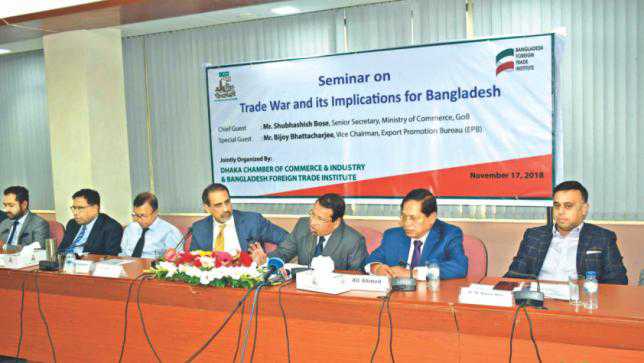US-China trade war a blessing: study

The ongoing trade war between the US and China has been a blessing for Bangladesh as the local exporters, especially garment makers, have been receiving a lot of work orders from both China and the US, according to a new study revealed yesterday.
“It is an opportune moment for Bangladesh as China also announced tariff cuts on goods imports from the country,” said Abul Kasem Khan, president of the Dhaka Chamber of Commerce and Industry, at a seminar organised at its office in the capital.
Many buyers are coming back to Bangladesh and the country's share in the American garment market increased 6.46 percent in the first nine months of the year, said Ali Ahmed, chief executive officer of Bangladesh Foreign Trade Institute, who authored the study 'Trade war and its implications for Bangladesh'.
Other than the inflow of work orders for apparel items for competitive pricing, Bangladesh will also benefit in its cotton purchase as China has stopped buying from the US.
China used to purchase cotton worth a little more than $1 billion from the US.
Now, Bangladesh is the largest cotton importer as China stopped sourcing the white fibre to subsidise its domestic growers and to end the previous stocks.
Already the cotton price fell 10 percent year-on-year in the October-November period due to oversupply, Ahmed said at the seminar, which was attended by exporters, importers, trade experts, entrepreneurs, trade body leaders and government higher-ups.
Bangladesh will also receive a lot of investment as the owners of the Chinese sunset industries are looking for new destinations as production costs in China rose due to higher tariff measures by the US and shortage of skilled workforce.
The global foreign direct investment flows fell 23 percent to $1.43 trillion in 2017.
Khan also called for exercising caution when receiving FDI because in many areas like in the garment sector the local entrepreneurs are performing well.
The recent trade war may not sustain for a long time, said Shubhashish Bose, senior secretary of the commerce ministry.
As a result of the trade war many factories from China may be relocated to some of the potential Asian countries and Bangladesh should chase this lead. “If we want to attract Chinese sunset industries to Bangladesh we need to stress infrastructure development, skill development and technology based industry capacity.”
Regarding the devaluation of the taka against the dollar, he said it will be a risky step as devaluation of the taka may increase inflation.
“The industrial revolution is ahead of us, so we need to focus on manufacturing robotics, software and machinery.”
For this, the public and private sectors will have to work hand-in-hand.
“Because of this trade war, our backward linkage industry will flourish more,” Bose added.
M Masrur Reaz, a senior economist of the World Bank, stressed trade liberalisation, cost competitiveness, skills development and trade reforms.
“The trade war will give us some opportunities, but the country is not yet ready to get the benefits,” said Humayun Rashid, former senior vice-president of the DCCI.
He also called for the facility to open letters of credit accounts in the Chinese currency.
“Due to lack of infrastructure we are falling behind in manufacturing electronic products,” said Mostafa Abid Khan, member of the Bangladesh Trade and Tariff Commission.
Source: https://www.thedailystar.net
Previous Story
- September apparel exports up; industry confident of US...
- Bangladesh deserves more attention than it gets
- IPI will demand justice in the murder of...
- Envoy calls for bigger Indian investment in B'desh
- Made in Pakistan: Why exporting apparel is the...
- It’s No Longer Just a Trade War Between...
- Bangladesh to be 26th largest economy
- US auto sales fell by 4 percent in...